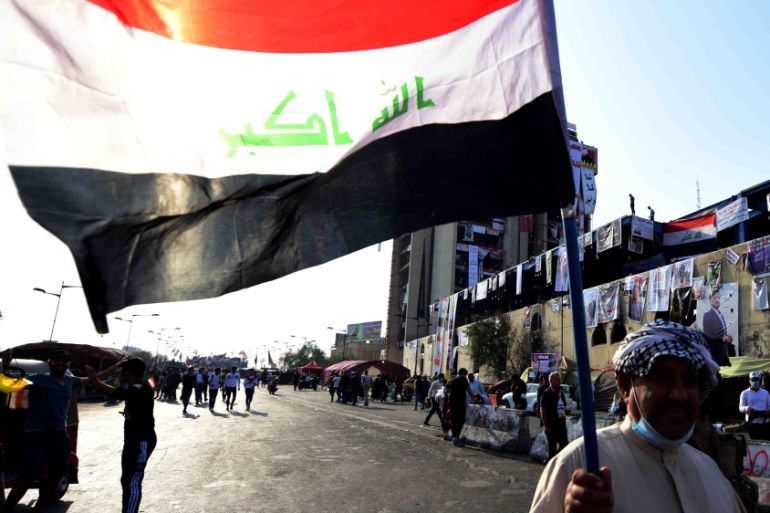Amid protests, Iraq’s top Shia leader calls for new election law
Grand Ayatollah Ali al-Sistani says fresh poll needed to end Iraq’s deepening, deadly political crisis.

Iraq‘s top Shia leader, Grand Ayatollah Ali al-Sistani, has called for new election law to restore public confidence in the country’s political system amid weeks-long mass anti-government demonstrations.
In a weekly sermon delivered by a representative in the Shia holy city of Karbala, al-Sistani said on Friday that a fresh poll would give voters the opportunity to bring “new faces” to power in Iraq.
Keep reading
list of 3 itemsIraq protests: How tuk-tuks became symbol of resistance
Habbaniyah, Iraq: From celebrity haunt to safe haven among ruins
“Passing a law that does not give such an opportunity to voters would be unacceptable and useless,” al-Sistani said.
“If those in power think they can evade dealing with real reform by procrastination, they are mistaken,” he added. “What comes after the protests is not the same as before, so be careful.”
More than 300 people have been killed and thousands of others wounded since the protests erupted at the start of October, sparked by widespread anger over official corruption, mass unemployment and failing public services.
The demonstrations have gripped Baghdad and several cities in Iraq’s south, posing the biggest challenge yet to the year-old government of Prime Minister Adel Abdul Mahdi, who has moved to try and quell the unrest by pledging to reshuffle his cabinet and deliver a package of reforms.
Iraq’s President Barham Salih has meanwhile promised to hold a snap parliamentary election once a new law is passed, but has not outlined any timeline for the vote.
The measures have failed to appease protesters, however, with the ire of those demonstrating focused on Iraq’s entire political establishment.
Many say the country’s authorities have failed to improve the lives of its citizens despite a period of relative calm ushered in following the defeat of the Islamic State of Iraq and the Levant (ISIL or ISIS) armed group two years ago.
Al Jazeera’s Natasha Ghoneim, reporting from the capital Baghdad, said protesters were “as clear with their demands” as they had been at the beginning of the demonstrations.
“Their demands are that the current government resign and elections be held,” Ghoneim said.
“It is clear the government is attempting to tamp down the protesters’ anger but there remains a very large divide between the protesters and the government,” she added. “So what we have is a political stalemate.”
‘Rampant deterioration on all fronts’
Friday’s developments came as protesters called for large rallies to take place after renewed clashes overnight in central Baghdad.
Security forces have used live ammunition, tear gas and stun grenades against mostly young and unarmed protesters in a bid to put down the protests.
But al-Sistani said the demonstrations would continue “despite the heavy price and grave sacrifices it [the movement] requires”.
“Because they [the protesters] found no other way to revolt against the corruption which is getting worse day after day, and the rampant deterioration on all fronts,” he said.
On Monday, al-Sistani said he backed a plan by the United Nations mission in Iraq aimed at meeting the demands of the protesters, but expressed concern that political parties were not serious about carrying out the proposed reforms.
He said corruption among the ruling elite has reached “unbearable limits” while large segments of the population are finding it increasingly impossible to have their basic needs met while top leaders “share the country’s wealth among themselves and disregard each other’s corruption.”
Nearly three-fifths of Iraq’s 40 million people live on less than six dollars a day, World Bank figures show, despite the country housing the world’s fifth-largest proven reserves of oil.
Millions lack access to adequate healthcare, education, clean water and electricity, with much of the country’s infrastructure in tatters.
Washington also welcomed the UN plan, but protesters did not welcome that. They perceive Iraq’s leaders as subservient to one of the country’s two main allies, the United States and Iran – powers they believe are more concerned with wielding regional influence than the needs of ordinary Iraqis.